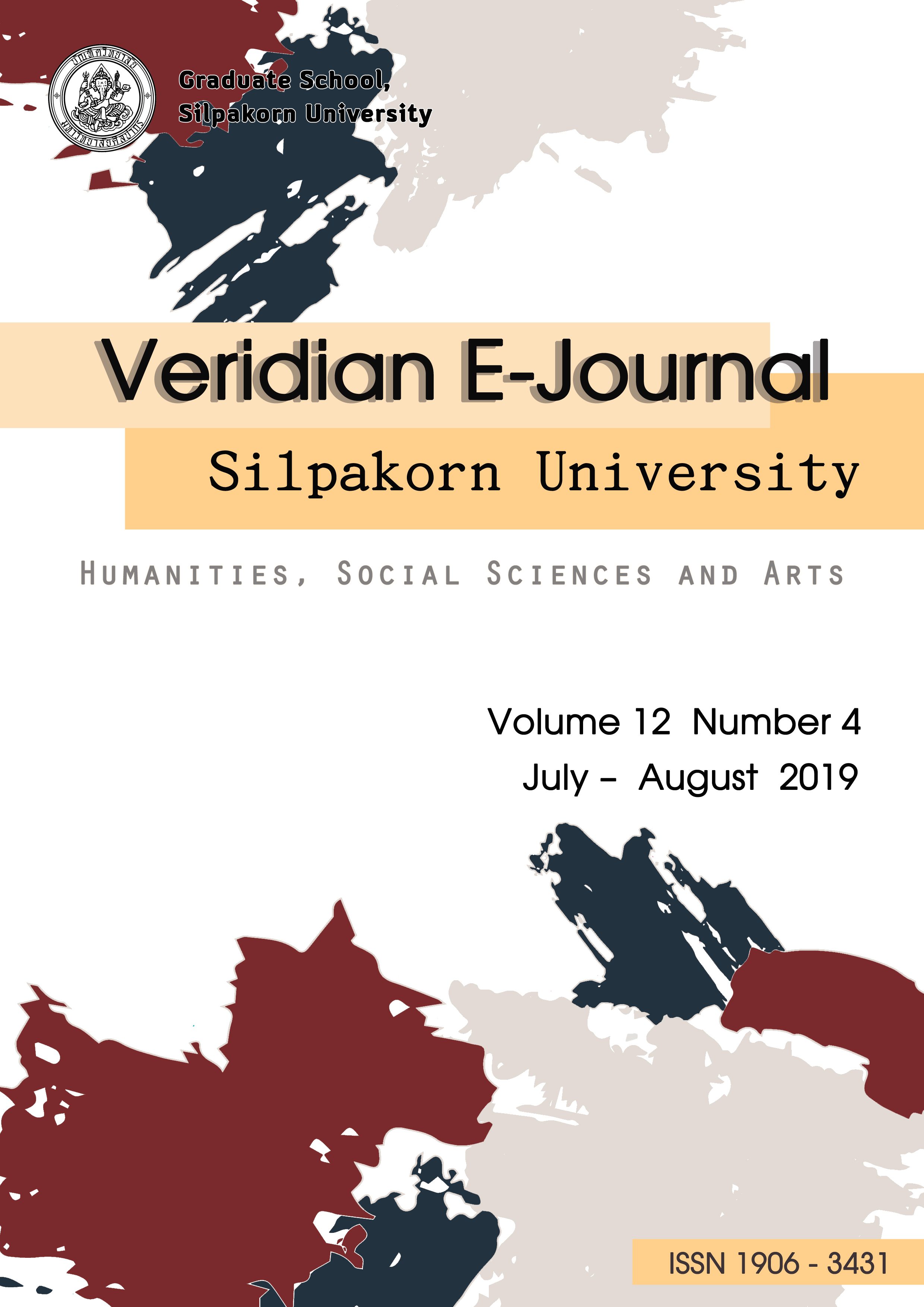การพัฒนารูปแบบนวัตกรรมบทเรียนออนไลน์ เพื่อการเรียนรู้ตลอดชีวิตของผู้สูงอายุ (Development of Innovation Digital Learning with lifelong learning Model for the Elderly)
Main Article Content
บทคัดย่อ
การวิจัยครั้งนี้มีวัตถุประสงค์เพื่อศึกษาพัฒนาและประเมินผลของรูปแบบนวัตกรรมบทเรียนออนไลน์เพื่อการเรียนรู้ตลอดชีวิตของผู้สูงอายุ กลุ่มตัวอย่างในการวิจัยนี้ประกอบด้วย 2 กลุ่ม คือ 1) ผู้เชี่ยวชาญด้านการพัฒนารูปแบบ ได้แก่ ผู้เชี่ยวชาญที่มีความรู้ประสบการณ์ด้านเทคโนโลยีนวัตกรรมการเรียนรู้ตลอดชีวิต และ 2) กลุ่มตัวอย่างผู้เรียน ได้แก่ ผู้สูงอายุจำนวน 30 คน ที่ศึกษาในหลักสูตรการเรียนรู้กิจกรรมทางกายผู้สูงอายุแบบองค์รวม คณะศึกษาศาสตร์และพัฒนศาสตร์ มหาวิทยาลัยเกษตรศาสตร์ วิทยาเขตกำแพงแสน จังหวัดนครปฐม เครื่องมือที่ใช้ในการวิจัย ประกอบด้วย รูปแบบนวัตกรรมบทเรียนออนไลน์เพื่อการเรียนรู้ตลอดชีวิตของผู้สูงอายุ แบบทดสอบวัดผลทางการเรียนรู้เทคโนโลยี แบบสอบถามทัศนคติผู้สูงอายุ และแบบประเมินทักษะการใช้เทคโนโลยีเพื่อการเรียนรู้ สถิติที่ใช้ในการวิเคราะห์ข้อมูล ได้แก่ ค่าเฉลี่ย ส่วนเบี่ยงเบนมาตรฐาน และ การทดสอบค่าที
ผลการวิจัย พบว่า รูปแบบนวัตกรรมบทเรียนออนไลน์เพื่อการเรียนรู้ตลอดชีวิตของผู้สูงอายุ โดยบูรณาการหลักการเรียนรู้ด้วยเครื่องมือนวัตกรรมทางการศึกษาเทคโนโลยีบทเรียนออนไลน์และทฤษฎีเกี่ยวกับการเรียนรู้ตลอดชีวิต และสมรรถนะการเรียนรู้เทคโนโลยี ประกอบด้วยองค์ประกอบ 3 ส่วน คือ ปัจจัยนำเข้า ปัจจัยกระบวนการ และปัจจัยผลผลิตมีผลการประเมินความเหมาะสมรูปแบบจากผู้เชี่ยวชาญอยู่ในระดับมาก ( =4.42) และมีประสิทธิภาพจากการนำไปทดลองใช้อยู่ที่ระดับดีขึ้น ซึ่งเป็นไปตามเกณฑ์ที่กำหนดไว้ ส่วนผลการประเมินสมรรถนะของผู้สูงอายุจากการใช้รูปแบบนวัตกรรมบทเรียนออนไลน์เพื่อการเรียนรู้ตลอดชีวิตของผู้สูงอายุในภาพรวม พบว่า ผู้สูงอายุมีสมรรถนะสูงขึ้น โดยพิจารณาเป็นรายด้าน พบว่า
1) ด้านความรู้การใช้เทคโนโลยีเพื่อการเรียนรู้ตลอดชีวิต มีผลสัมฤทธิ์ทางการเรียนรู้ของกลุ่มผู้สูงวัยที่เรียนโดยใช้รูปแบบนวัตกรรมบทเรียนออนไลน์ สูงกว่าก่อนเรียนรู้พัฒนาสมรรถนะอย่างมีนัยสำคัญทางสถิติที่ระดับ 0.05
2) ด้านทัศนคติการใช้เทคโนโลยีเพื่อการเรียนรู้ตลอดชีวิต กลุ่มผู้สูงอายุที่เรียนด้วยรูปแบบนวัตกรรมบทเรียนออนไลน์เพื่อการเรียนรู้ตลอดชีวิต มีทัศนคติสูงมากขึ้น โดยเฉพาะความรู้สึกเกี่ยวกับการใช้เทคโนโลยีช่วยทำให้เรียนรู้สิ่งใหม่ๆ การใช้สมาร์ทโฟน ช่วยในการติดต่อสื่อสาร การใช้เทคโนโลยีทำให้เรียนรู้จากสื่อที่หลากหลาย และการเรียนรู้เทคโนโลยีทำให้เข้าใจคนสมัยใหม่มากขึ้น
3) ด้านทักษะการใช้เทคโนโลยีเพื่อการเรียนรู้ตลอดชีวิต ผลการประเมินด้านทักษะพบว่าผู้สูงอายุที่เรียนรู้โดยใช้รูปแบบนวัตกรรมบทเรียนออนไลน์เพื่อการเรียนรู้ตลอดชีวิตสูงกว่าก่อนเรียนรู้ โดยเฉพาะทักษะใช้สมาร์ทโฟน สูงที่สุดถึงร้อยละ 81.3
This research aims to develop and evaluate innovative digital learning models for lifelong learning among the elderly. The sample groups in this study were: 1) an experts group with knowledge and experience in technology, innovation and life-long learning for the elderly. 2) a sample of 30 elderly studied in the Holistic Health Learning Program for the Elderly at the Faculty of Education and Development Sciences, Kasetsart University, Kamphaeng saen campus ,Nakhon-Pathom. The research tools included innovative digital learning models for lifelong learning among the elderly, technological learning assessment, attitude questionnaire in elderly, and technological skills for learning assessment. Statistics used for data analysis were mean, standard deviation and t-test.
The research found that innovative online lessons for lifelong learning for the elderly, through integrating learning principles with educational innovation tools, online learning technology, and theories of lifelong learning as well as technology literacy consisting of three components; namely; inputs factors, process factors and output factors. The results of the expert evaluation were at the high level ( = 4.42) and the effectiveness of the online lessons trial was at a better level to which meet the developmental criteria. The results of over all performance evaluation were at higher level, particularly in the following:
1) Knowledge on using technology for lifelong learning through innovative digital learning model were higher than before at the 0.05 level.
2) Attitude toward using technology for lifelong learning after took part in the program were at higher level, particularly in the contribution of technology that helps the elderly to learn something new, make ease to communicate, learned more from diverse media , and get to know the new generation.
3) Skills in using technology for lifelong learning were higher than before, especially highest in smart phone skills at 81.3%.

